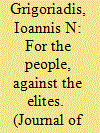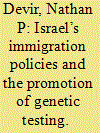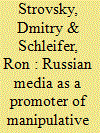|
|
|
Sort Order |
|
|
|
Items / Page
|
|
|
|
|
|
|
| Srl | Item |
| 1 |
ID:
171188


|
|
|
|
|
| Summary/Abstract |
This article examines the Kenya Colony administration’s use of communal labor as a punitive, coercive labor practice during the Mau Mau rebellion of the 1950s. Faced with the Mau Mau rebellion, the administration transformed the preexisting communal labor system and began to use it on an unprecedented scale as a form of collective punishment against the mainly Kikuyu African civilian populations thought to be in collusion with the Mau Mau guerrillas. Communal labor, which was previously justified as a building block of development and used widely throughout the colony as cooperative village labor, now became an aspect of the punitive “rehabilitation” of the Kikuyu populace in Central Province. Although colonial officials directed Emergency communal labor against all of the African civilians living in the rural areas of Central Province thought to be in tacit support of Mau Mau, women were the corps of most of the communal labor work parties. As a result, this article examines the role of gender in the British administration’s wielding of communal labor as a punitive measure in Central Province during this time period. This window into the machinations of communal forced labor also sheds more light on the wider issue of gender and forced labor during the colonial period in Africa.
|
|
|
|
|
|
|
|
|
|
|
|
|
|
|
|
| 2 |
ID:
171190


|
|
|
|
|
| Summary/Abstract |
While the rise of populism has been a global trend in recent years, it has been prevalent in Greece and Turkey for longer, leaving a strong imprint on the politics of both countries. Left-wing populism has become one of the constitutive elements of the Greek political party system since the collapse of the 1967–1974 military regime. The 2009 outbreak of the Greek economic crisis set the stage for the radicalization of Greek politics through the rise of extremist far-right and far-left populist parties that professed populist agendas of different hues. Such populists accused old-party personnel of being members of a “treacherous elite” that sacrificed Greek national interests against foreign powers. The 2011 “indignados” movement is key for the better understanding of the social dynamics that facilitated the rise of the unusual SYRIZA-ANEL coalition government. Debates on Greek constitutional reform also highlighted the relevance of populism, especially as the SYRIZA-ANEL government sought topics to resonate with its disenchanted voters. On the other hand, a right-wing populist rhetoric has been one of the key instruments for the rise of Turkish political Islam and the establishment of the AKP hegemony in Turkey. Establishing a Kulturkampf-based narrative about the “secularist, ‘white-Turk’ elites” versus the “conservative, ‘black-Turk’ people” was of great political significance. The constitutional reform process proved again crucial for manifesting the relevance of populism in Turkish political discourse. This article explores the circumstances under which left- and right-wing populism have emerged into a dominant feature of Greek and Turkish politics. It also discusses the decreasing relevance of the established left-right political divide in party politics and suggests alternative classifications.
|
|
|
|
|
|
|
|
|
|
|
|
|
|
|
|
| 3 |
ID:
171191


|
|
|
|
|
| Summary/Abstract |
The aims of this study are to document a relevant array of perspectives on the use of genetic testing for the purposes of approving immigration to the state of Israel, and to consider the potential implications of such testing for the larger Jewish world. Further, this work analyzes the views of a number of prominent national figures — in the rabbinical, governmental, educational, and private sectors in Israel — on this subject. Finally, it provides a critical assessment of the varying contentious scenarios that may manifest themselves with regard to the claims of contested Jewish communities from the Global South whose genetic “evidence” is not as readily accessible as is that of Jews hailing from established centers of Jewish life.
|
|
|
|
|
|
|
|
|
|
|
|
|
|
|
|
| 4 |
ID:
171186


|
|
|
|
|
| Summary/Abstract |
The content of mass information in any society is closely linked to the patterns of its political development. A typical example of this concerns the modern Russian media, which have been influenced particularly by their embeddedness with the authorities. Indeed, the Russian media have served as the mouthpiece of the country’s political leaders, and this fact has left a significant imprint on media coverage. To understand the symbiotic relationship between Russian political leaders and media, this article focuses on the Syrian Civil War, which is currently one of the most important issues on the international political agenda. The Russian government’s role in the conflict over the last several years has affected the Russian media’s tremendous interest in this topic. Nonetheless, Moscow’s participation in the war was determined uniquely by how the communication sphere related the conflict to its audience so that its involvement in the Syrian imbroglio was not an objective reflection of reality. Guided by the political interests of the authorities, the Russian media created an emotionally oriented story, which intended to advance an extremely positive interpretation of Russia’s role in this conflict in the minds of the audience. Therefore, in terms of propaganda, these media acted not as “pure” promoters of the state’s will, but rather as its “interpreters.” This study highlights how leading Russian publications approach this agenda and the consequences this fact has for the Kremlin’s political priorities. The authors come to a definite conclusion regarding Russian media’s unconditional dependence on the political priorities of modern Russian society. It was crucial for the Kremlin that the media present a positive view of Moscow’s involvement in the conflict given that Russia’s military presence in Syria caused a very controversial reaction throughout the world and led to increased tensions and contentious disputation between Russia and many Western countries. Therefore, the Kremlin needed to justify its policies and did so through manipulating the Russian public by means of a large-scale propaganda campaign conducted through the Russian media. This phenomenon is pivotal to understand not only the case of Russia’s involvement in Syria but also contemporary international media development.
|
|
|
|
|
|
|
|
|
|
|
|
|
|
|
|
| 5 |
ID:
171193


|
|
|
|
|
| Summary/Abstract |
If the lifting of the Saudi women’s driving ban on June 24, 2018 was so momentous, why did so few women embrace the opportunity to drive? Answers to this question are considered in the following pages, informed by two months of fieldwork (June–August 2018) in the Kingdom, during which interviews, participant observation, and the author’s own June 2018 driving experiences, reveal that despite the media hype, and the significance of the event, only a handful of women in Saudi Arabia are driving. Even more than a year after lifting the ban, it is still a novelty to see women driving in the Kingdom (Lulwa Shalhoub, “Saudi Arabia: My Experience as Female Driver: One Year On,” BBC News, June 24, 2019, https://www.bbc.com/news/world-middle-east-48661233).This article argues that the government’s new gender inclusive driving policy embodies a rebranding effort from the top, rather than responsiveness to Saudi women’s rights activism, or public opinion. The arrest of a number of Women2 Drive activists before June 24 sends a clear message that such changes are not the beginnings of an intended “pink revolution” (Ghazanfar Ali Khan, “Three Million Saudi Women on the Roads by 2020,” Arab News, June 24, 2018, http://www.arabnews.com/node/1326991/saudi-arabia). On the contrary, allowing women to drive fulfills several of Crown Prince Muhammad bin Salman’s immediate Vision 2030 goals for economic and social reform in the kingdom.The impact of a projected 3 million female drivers in the kingdom by 2030, however, will not only potentially “empower women” and “change the employment landscape of the country,” but also may result in a host of unintended consequences enabled by enhancing women’s access to capital, mobility and autonomy (Thomas Oriti and Laura Brierly Newton, “Women in Saudi Arabia Have a Long Way to Go in Order to Be Free, Says Manal al Sherif,” ABC News, February 11, 2018, https://www.abc.net.au/news/2018-02-08/saudi-women-revolution-has-a-long-way-to-go-says-manal-al-sharif/9396306, accessed online November 29, 2018). The biggest barrier to women’s advancement in the Kingdom, nonetheless, is the guardianship law, not the inability to drive a car.
|
|
|
|
|
|
|
|
|
|
|
|
|
|
|
|
|
|
|
|
|